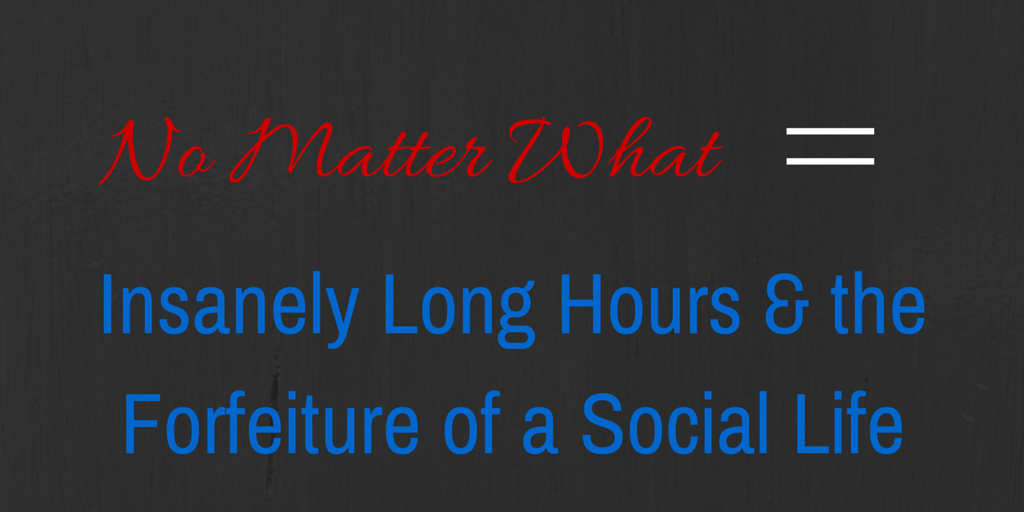We’ve all seen it. Some of us have even experienced it.
It can be known as having your priorities out of whack. In other circles, they’re referred to as workaholics. Spiritually, it’s known as idolatry.
At it’s root, it’s arrogance. Nothing else in this world matters other than your work. For these individuals, nothing comes before their work. I know, I was on this path for a long time.
If you’ve ever spent time with someone like this, it’s obvious they have a hard time focusing on you. They repeatedly check their phone for texts and emails, even if it didn’t make a noise. They make eye contact, but their mind is elsewhere.
How it Starts
At first, it’s an urge to want get ahead (men, we’re very driven by this need to provide). Then comes the excuse to make sure “everything is running smooth.” And then come the lies that the place would fall apart without you, the fallacy that you have that much on your plate, and the “realization” that nobody cares as much as you do.
But when you realize that nobody cares as much as you do, it’s a double edged sword. As a business owner, you can’t expect anyone else to care more than you. It may come out as a complaint, but it’s really a statement of pride. Your self-inflicted “burden” as the owner of a business is to drive it to success.
The unfortunate truth is that you’d rather stay and work. It’s easier to stay and work because that’s where you’re comfortable.
But most of the time excuses are made and family gets pushed to the back burner. This haughtiness sends a beacon signal to loved ones that they are not as important as the contributions you are making to your work. Even if you are working on a cure for cancer, you’re not likely to tell your spouse your work is more important than they are. Your actions may show it, but you’d never admit it. And 99.9% of us aren’t working on a cure for cancer.
It’s hard to take care of your family or go improve yourself when other things are pulling on you. In most times of crisis, the best respond and take care of their family. Unfortunately, a crisis is what helps you realize where you should be spending your time.
The Discipline of Coaches

Back in the day at CSU
One thing I loved about my days playing football was the constant reminders from the coaching staff about what our priorities should look like:
1.) Faith
2.) Family
3.) Academics
4.) Team
They were happy to be 4th on the list of priorities. They knew if we began to “worship” football everything else would suffer. It was good for us to be taught this way, not everyone has this idea handed to them.
If we couldn’t focus on anything but our sport, our lives would be ruined once football was over. If the thing that we hold above all else is taken away, football in this example, we would have been ruined. And for every football player, the sport ends at some point or another.
They were setting us up for long-term success by teaching us to have our priorities in the right order.
A Reason to Leave
I loved what Jason Fried of 37 Signals says in his book Rework about choosing to hire people with outside obligations:
“When people have something to do at home, they get down to business. They get their work done at the office because they have somewhere else to be. They find ways to be more efficient because they have to. They need to pick up the kids or get to choir practice. So they use their time wisely.”
-Jason Fried, Rework
Put yourself through this test. Think about the last time you left work to do something for yourself or another person.
*CRICKETS*
You’ve probably lingered and tinkered and toyed into the night as we all have. It’s this lack of urgency that is counterproductive.
Fried also explains that having employees that are solely focused on their job makes them slaves to it. They never leave, and they can’t think outside of the box. Their work becomes sloppy and the business suffers.
If this sounds all too familiar, set a time each day and find a reason to leave. You’ll be much happier and you’ll get more done.
What Happens to Us
When work is the most important thing in your life, you begin to feel like Ricky Bobby with a Fig Newton sticker on your front windshield. It’s not practical and it blinds you to other things that are important to see.
If the only thing in sight is work, you begin to spend more and more time on it while spending less time with loved ones or improving yourself. Tim Ferris, author of the The 4-Hour Workweek, champions Parkinson’s Law, “work expands so as to fill the time available for its completion” and I’ve begun to fall in line over the past couple years.
When the largest image in the foreground of your life is work, you’ll never lose focus of it. But you will lose focus of other things that are important like God, family, friends, and taking care of yourself.
I have become a huge advocate of sharpening your own ax. If you don’t work on yourself, you are doing your family, friends, and your work a disservice. When you take time for yourself, you are becoming a better person. This can be learning new skills, finding mental clarity, or working on side projects. At the end of the day, you’re able to offer a better version of yourself to all of your responsibilities. No matter which rung of the priorities ladder it may sit.
Entrepreneurial Entrapment
Getting a business off the ground is hard. It takes ideas, commitment, and a willingness to fail that supersedes all else. You have to be willing to fail or you’ll never have the guts to start.
But nobody goes into a new business with the mindset that they’re going to fail. They go into the new business with the mentality of that they’re going to get it done, no matter what.

Entrepreneurs are especially guilty of letting their ax get dull. Their business becomes this all-consuming monster of a project that requires endless amounts of resources to be kept at bay. And since you started it, the burden of feeding this monster falls in your lap.
I understand this cycle, I’ve lived it from the inside and I’ve observed it from the out. Most businesses needs tons of attention in the beginning. There’s always something that needs to be done and there’s never enough resources. But after that initial push to get things up and rolling, many entrepreneurs continue to feed the beast their lives.
Relationships whither. They spend less time researching and more time checking off menial tasks. And worst of all, they set the tone for how they want their team to act.
When I was with the furniture company, I had to fit into the culture. The culture consisted of a husband and wife I worked for. It was simple, they championed long hours and hard work. They didn’t celebrate family time or continual education. They took pride in the fact that they worked 14 hour days.
So I began to take pride in 14 hour days. And then 80+ hour weeks. And 3 week work trips. And then I burned out…
Reenact that scene with my former employers leaving at 5 PM each day to be with their kids. My priorities would be different. My idea of approval (as I was seeking it from them) would have been different.
Just like children, employees will put more importance in your actions than your words. If you, as an entrepreneur, want to create a culture of workaholics all you have to do is stay late every day. Watch how people compete with you. Your early mornings and late nights won’t be lonely for very long.
The way in which you set your priorities is one of the most important examples you set for your people.
Leave me a comment or chat with me on Twitter, I’d love to hear from you. Have a great week!
—


